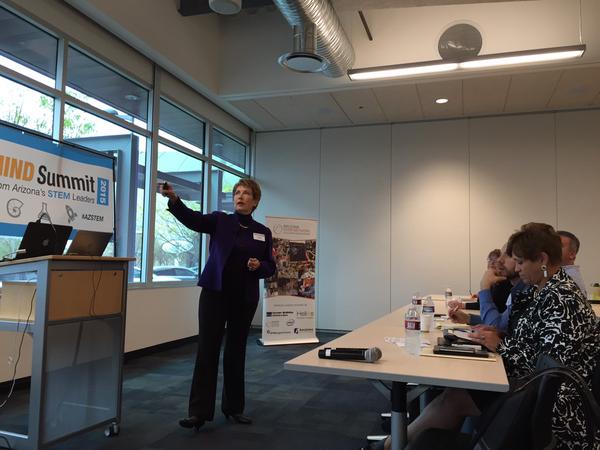
"Questions are more important today than answers."
- Erno Rubik

Leaders in STEM education joined Arizona educators and MIND Research Institute last week at the Arizona MIND Summit. After more than 100,000 students failed the math portion of the Arizona Instrument to Measure Standards this year, math is one of the top concerns for educators in Arizona. The summit examined STEM education in the state and offered thought-provoking discussions on how to move math education forward.
Elements of Success in STEM Education
Rich Crandell, former Director of the Wyoming Department of Education, opened the conversation by encouraging educators to keep the big picture in mind. "Dollars in the classroom don't move schools forward. Hard work, teacher quality, STEM learning and literacy are the focus four," Mr. Crandell stated.
Dr. Jo Anne Vasquez of @HeliosEdFnd: #AZSTEM education "is about application. You can't apply what you don't know."
— Amy B Wang (@amybwang) January 30, 2015
Dr. Jo Anne Vasquez of Helios Education Foundation emphasized the importance of quality teachers as well as the importance of learning by doing and applying what you have learned.
Revolutionizing Math Education
.@drtedcoe on instrumental vs. relational learning: Fmr trains students to be "slow, buggy versions of Excel" #AZSTEM pic.twitter.com/zXzB1TPHbv
— Amy B Wang (@amybwang) January 30, 2015
Dr. Ted Coe, Director of Math at Achieve, encouraged the audience to take a hard look at how math is defined. “There are two different subjects taught in our schools, both called mathematics," he said, describing math both as manipulating numbers like computer programs and as everyday problem solving. Do we really need students to be slower versions of Excel? Tom Vander Ark of Getting Smart reinforced this idea of understanding math as the basis for problem solving, creativity and innovation.
We need to help our kids develop an Innovation mindset. @tvanderark #AZSTEM pic.twitter.com/eCL6GxliVQ
— MIND Research (@MIND_Research) January 30, 2015
The summit culminated in the discussion around understanding math on a deeper level with Dr. Matthew Peterson, CEO and Senior Scientist at MIND Research Institute. While many programs promote deep understanding, they lack the ability to scale. "We are trying to build deep understanding in a consistent and scalable way," Dr. Peterson said of the ST Math program he and his colleagues develop. ST Math is currently used by over 800,000 students in over 2,600 schools across the U.S., continuing to scale every year.
Read more great quotes from the MIND Summit on our storify.
Interested in joining MIND Research Institute at an event? Find a list of our upcoming events on our website!

Brienne is a Director of Education Success and former Elementary School Teacher. She speaks on behalf of the MIND Research Institute across the country to illuminate the power and necessity of neuroscience-based, interactive math software that is designed to teach all students how math really works.
Comment